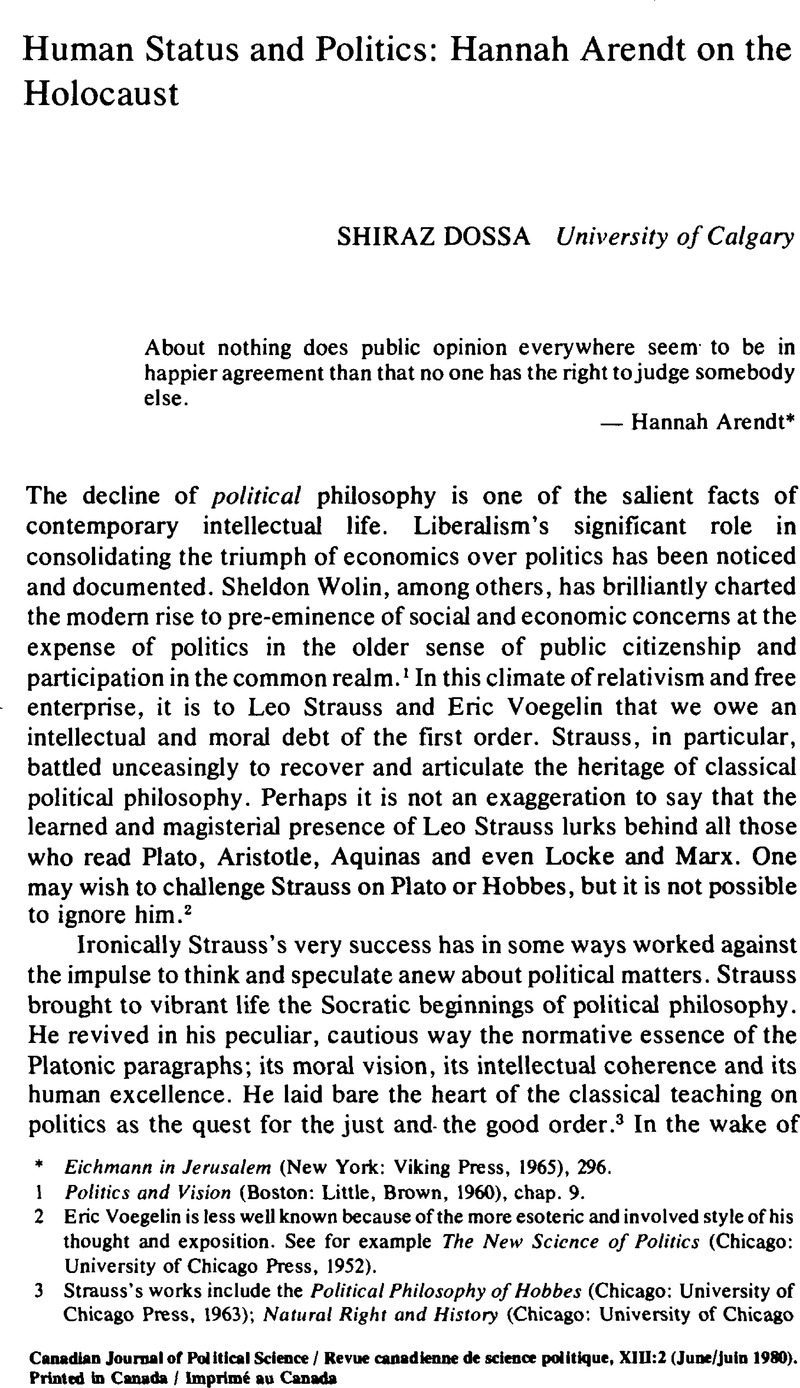Published online by Cambridge University Press: 10 November 2009

* Eichmann in Jerusalem (New York: Viking Press, 1965), 296Google Scholar.
1 Politics and Vision (Boston: Little, Brown, 1960)Google Scholar, chap. 9.
2 Voegelin, Eric is less well known because of the more esoteric and involved style of his thought and exposition. See for example The New Science of Politics (Chicago: University of Chicago Press, 1952)Google Scholar.
3 Strauss's works include the Political Philosophy of Hobbes (Chicago: University of Chicago Press, 1963)Google Scholar; Natural Right and History (Chicago: University of Chicago Press, 1953)Google Scholar; and Thoughts on Machiavelli (Seattle: University of Washington Press, 1969)Google Scholar.
4 This view is shared, for example, by Canovan, Margaret, The Political Thought of Hannah Arendt (London: J. M. Dent and Sons, 1974)Google Scholar, chap. 1.
5 Cameron, J. M. in his review of two of Arendt's books in The New York Review of Books, November 6, 1969Google Scholar. Soon after her death, Maurice Cranston quite rightly said that, as a thinker, “Hannah Arendt was altogether hors categorié” (in Encounter, March 1976, 56)Google Scholar.
6 Review of Politics 15 (1953), 74.
7 Ibid.
8 Ibid.
9 Ibid., 80.
10 “Understanding and Politics,” Partisan Review 20 (1953), 379Google Scholar.
11 Arendt, Hannah, The Origins of Totalitarianism (New York: Meridian, 1958), ixGoogle Scholar.
12 Review of Politics, 73.
13 Ibid., 68
14 Origins of Totalitarianism, 350–53.
15 Ibid., 440.
16 Arendt, Hannah, The Human Condition (New York: Doubleday Anchor, 1959)Google Scholar, especially chaps. 27 and 28, and On Violence (New York: Harcourt, Brace and World, 1970)Google Scholar, particularly 63.
17 Origins of Totalitarianism, 185 and passim.
18 Eichmann in Jerusalem, 86.
19 Origins of Totalitarianism, 440.
20 Ibid., 439–41.
21 Arendt, Hannah, Between Past and Future (New York: Viking Press, 1968), 53Google Scholar; Arendt insisted that doctinaire morality had no place in politics. When it did emerge as the dominant impulse behind political action, as in the French Revolution of 1789, it invariably led to indiscriminate violence and terror; see her On Revolution (New York: Viking Press, 1965)Google Scholar, especially chap. 2.
22 Origins of Totalitarianism, W5.
23 Ibid., 6–7.
24 Ibid., 449.
25 Ibid., 6–7; see also Eichman in Jerusalem, 297.
26 Origins of Totalitarianism, 452–53.
27 Ibid., 445.
28 Commentary, September 1946, 292.
29 Origins of Totalitarianism, 440.
30 See The Human Condition, especially sections II and V.
31 Origins of Totalitarianism, 437.
32 Ibid., 316.
33 Ibid., 433.
34 Ibid., 446.
35 Ibid., 297.
36 The Human Condition, especially section V.
37 Origins of Totalitarianism, 460–62.
38 Ibid., 459; her view of human nature is neither ontological in the Platonic sense nor thoroughly historical in the Marxian sense. For her, man is to a large degree a historical creature but he is endowed with permanent capacities forthought. freedom and action.
39 Ibid., 458–59.
40 Eichmann in Jerusalem, 279 (emphasis added).
41 Ibid., 288 (emphasis added).
42 Ibid., 272.
43 In her controversial report on the trial of Eichmann, Hannah Arendt noted with shock that Eichmann made a clear distinction between “cultured” and “primitive” Jews. On this basis, he was opposed not to the murder of Jews as such, but at “the idea of German Jews being murdered,” that is, the cultured Jews (Eichmann in Jerusalem, 96). Arendt's apparent shock is quite incongruous with her lack of concern for the murder of “primitive” Africans. Perhaps it is not unfair to suggest that what offended Arendt was the Nazi attempt to divide a group into higher and lower orders, who were collectively a civilized and cultured people. As well, the fact that the Jews are—for all intents and purposes—a European people, may well have something to do with her moral discomfort in this context.
44 Origins of Totalitarianism, 191–92.
45 Ibid.
46 Ibid., 190.
47 Ibid., 206 (emphasis added).
48 Ibid., 300.
49 Ibid., 296–97.
50 Ibid., 462.
51 Ibid., 455 (emphasis added).
52 Ibid., chap. 9; Eichmann in Jerusalem, 124–26, 297.
53 Origins of Totalitarianism, 194, 185.
54 Ibid., 195.
55 Arendt, On Revolution, 65.
56 Arendt, On Violence, 18.
57 Ibid., 96. Her ignorance of African culture and literature was truly astonishing. it to say here that Kiswahili is being taught and used in primary and secondary schools in Tanzania. It is the official language of debate and legislation in the national Parliaments of Kenya and Tanzania. Also worth mentioning is the fact that Julius Nyerere, President of Tanzania, has translated Shakespeare's Julius Caesar into Kiswahili—certainly a startling achievement for “a non-existent kind of no-language”!
58 The whole of The Human Condition is essential to understanding her ontology of politics and the condition of man. In this context see also her shocking essay on desegregation of public schools in the United States, “Reflections on Little Rock,” Dissent (Jan.-Feb. 1959), 45–56. In bare outline her argument was as follows: education is a “social” interest, as opposed to being a “political” one, and citizens have a right to discriminate in this sphere. Thus the federal government ought not to intervene and enforce desegregation of public schools. In effect the federal government, according to her, ought to turn a blind eye to segregation, in direct contravention of the principle of equal treatment enshrined in the Constitution. Needless to say the Negroes bore the brunt of the discrimination.
59 The Human Condition, 102, 86, passim.
60 Ibid., 102.
61 Ibid., 30–31.
62 Ibid., 112–13.
63 Ibid., 156–57.
64 Eichmann in Jerusalem, 268.
65 Commentary (September 1946), 293.